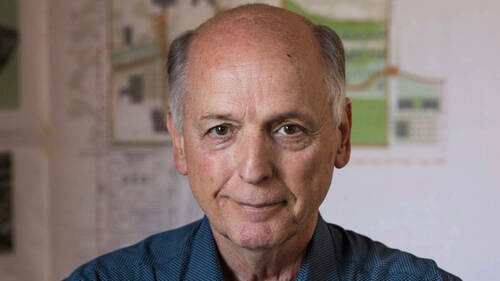
Stefanos Polyzoides, co-founder of the Congress for the New Urbanism (CNU) and partner in Moule & Polyzoides Architects and Urbanists, has been appointed the Francis and Kathleen Rooney Dean of the University of Notre Dame's School of Architecture by University President Rev. John I. Jenkins, C.S.C., effective July 1. He succeeds Michael Lykoudis, who is stepping down as dean after 16 years to return to teaching.
Polyzoides is an award-winning architect and urbanist whose approach to design emphasizes cultural continuity, urban regeneration, environmental responsibility and community engagement. He is co-founder and partner with his wife, Elizabeth Moule, of Moule & Polyzoides, Architects and Urbanists, a Pasadena, California-based firm with an international reputation for innovative design that has completed more than 700 projects around the U.S. and abroad since 1990.
“Stefanos brings to Notre Dame an international reputation for architectural work informed by tradition and moral purpose,” Father Jenkins said. “He brings together design, the realities of urban living and sustainable development to produce buildings that serve communities and humanity. His leadership will enrich our School of Architecture.”
In 1991, under the auspices of the California-based nonprofit Local Government Commission, Polyzoides, Moule and several colleagues developed a set of principles for community land use and architectural planning called the Ahwahnee Principles. The 15 principles — which stress walkability, sustainability, diversity and neighborhood and district design — laid the groundwork for the 1993 founding of the CNU, which today includes more than 3,000 members who promote integrated development through education, legislation and planning. Polyzoides and Moule are two of the six CNU founders.
“Stefanos is both a world-class educator and practitioner whose vast experience and ties within the architectural and urban design communities will be invaluable to our School of Architecture,” said Thomas G. Burish, the Charles and Jill Fischer Provost at Notre Dame. “His many years of experience in the academy, as well as his broad technical expertise and deep appreciation of the intersection of design, construction and community, will greatly benefit our students and faculty in architecture and in other areas of the University as well.”
“I am deeply honored to have been chosen by Notre Dame to be the next dean of its School of Architecture,” Polyzoides said. “In recent years, I have come to believe that this may well be the single institution in our country that prepares its students to address the diverse acute needs of our time. Not satisfied with teaching skills alone, the school professes an architecture and urbanism that is centered on human values, personal responsibility and community contribution.
“I plan to safeguard the school’s pedagogical excellence, while leading our faculty and students to renewing the process of learning from tradition and directing our collective energies to the urban, institutional and environmental challenges facing every region and culture of the world. Liz and I are excited about engaging with colleagues in various schools and departments whose work may illuminate the teaching and practice of architecture, and becoming active members of the Notre Dame family and South Bend community.”
Born in Athens, Greece, Polyzoides earned his bachelor’s and master’s degrees in architecture from Princeton University and has lived in Southern California since 1973. He was a faculty member at the University of Southern California School of Architecture from 1973 to 1996, and is a registered architect in California, Arizona, New Mexico, Florida and Texas.
A highly regarded speaker and lecturer on the subjects of architecture, transit-oriented and mixed-use development, housing and sustainability, Polyzoides is the coauthor of “Los Angeles Courtyard Housing: A Typological Analysis,” “The Plazas of New Mexico,” and is the author of “R.M. Schindler, Architect” and the forthcoming “In Praise of the Ordinary: The Architecture of Housing.” A monograph of the work of Moule & Polyzoides is due shortly.
Burish praised the search committee members who recommended Polyzoides from among a number of eminently qualified candidates considered during a national search.
“The search committee members represented the school and University well,” Burish said. “We owe them our gratitude for their diligence in helping to fill this vitally important leadership position.”